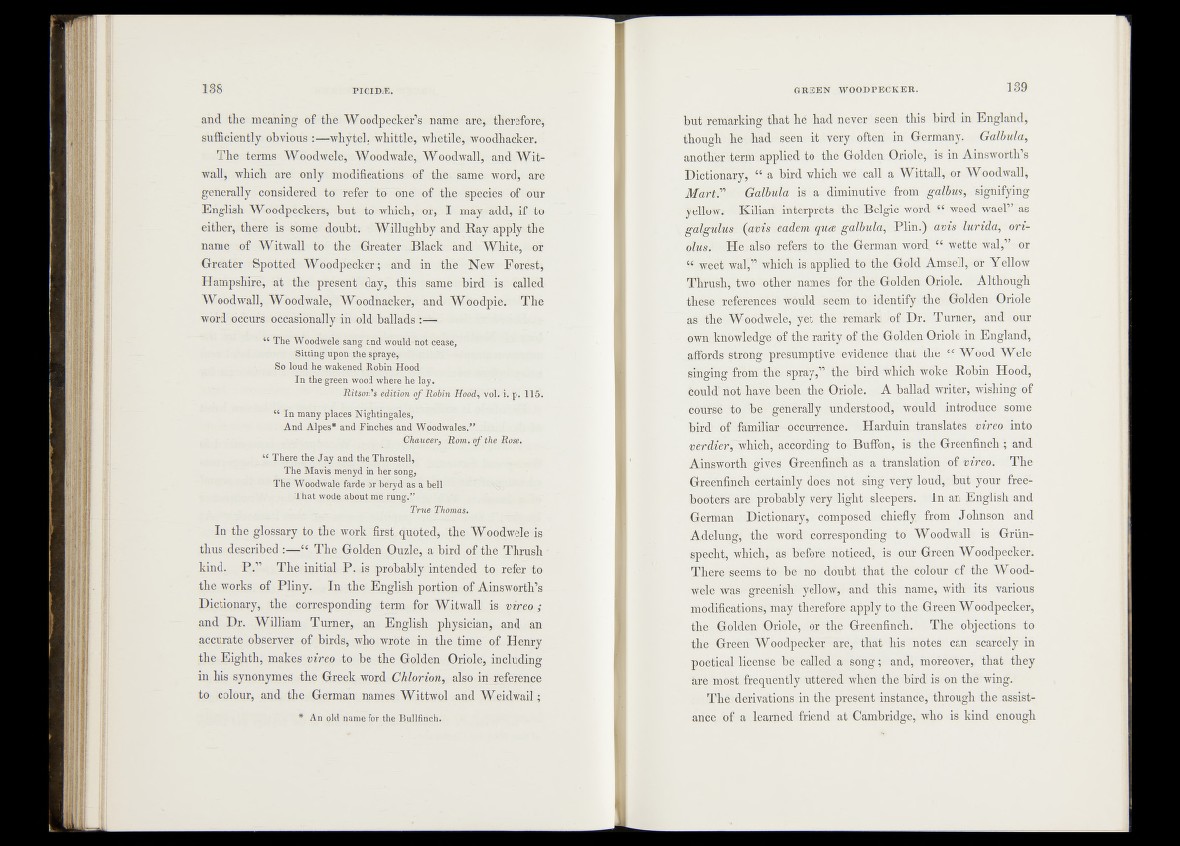
and the meaning of the Woodpecker’s^name are, therefore^
sufficiently obvious :—whytel, whittle, whetile,' woodhacker.
The terms Woodwele, Wood wale, Woodwall, and Wit-
wall, which are only the. same word, a§lr
generally considered to" refer to one of the species? ©f lour
English Woodpeckers, but to which,* or, I may . add, if to
either, there is some doubti * Willughby and Ray apply the
name of Witwall -'tb the Greater..Black andg White,$ or
Greater Spotted Woodpeeker^ and in the Mew Forest}
Hampshire, at the present day,’ this same .' bird is called
Woodwall, Woodwale,7Wa®dnaekerp and Woodpie^ The
word oecurs occa^onally in old ballads
■ * wThe WoodWele sang anu woifM-4rat dbaM/''
Sitting upon ih& spraye,-
So loud he wakeued BobiiTHood
In the-green wood where he lay.
Ritsim’s edition dj^RoBbi -Heiocti i. p. 1-1#.
“ 'In many places Nightingales,'''
And Alpes* and Finches and Woodwales.’A^H _ Chaucer, Rom. r f the Rose,'
u There the -Jay and the Throstell,
The Mavis=menyd in her song,.
The -Woodwale farde or beryd as a bell
That wode about me 0ngj-’.s y,
Truetlrkomas.
In the glossary to. the work first, qiioted} the Woodwele is
thus4escribedi : - ^ r,Th& Golden-Ouzle, a bird of tbe Thrush
kind. Pr.’u^ljThe mitial P . is probably intended (to refer to
the works of Pliny. . In the English portion of Ainsworth’s
Dictionary, the corresponding term for Witwall is. mreo.;
and Dr. William Turner, an English physician, and. an
accurate observer of birds,* who wrote in the time of Henry
the Eighth, makes virep to be the Golden Oriole, including
in his synonym es the Greek word Cklorioii,-. also in reference
to colour, and the German: names Wittwol and Weidwail;
* An pld name for the Bullfinch.
but remarking that hé had never seen ; this bird in England,
though he had seen it vesy' often in Germany. Galbula,
anothef’term appliéd' to the Golden Oriole,- is in Ainsworth’s
Dictionary, u a bird which vte.call a Wittall, or Woodwall,
Mart.” Galbula : is a diminutive from galbits, signifying
yellow.- Kiliari interprets the' Bfelgic word 4 4 Weed wael” as
galgulus. (at>is ^e'adem x[U& galbula, Plin.) avis lurida, ori-
olm.- He als<h référé to the-German word. 44 wette wal,” or
wéét waiy^ which/is; applied, to the Gold Amseb, or Yellow
Thrush, two other, namesr fop:tKe. Golden .Qrïoî#./! Although
these referenefes*' would ''fseelwiot identify; ffie Golden Oriole
as the Woódwelièbyèfltlfëremarld bfîDr. Tui®#i jànd our
own- knowledge of the rarity of the Golden Oriole in England,
jffords strong presumptive evidence that the 44 Wood Wele
singing from? $prasyj,a, the bird which woke?. Robin Hood,
couldfiotehay^iliel^Rthe Oriole.; A ballad waiter,^ wishing of
CÖHfsë ’t'ö ike' generally understood, would introduce some
bird of familiar-occurrence. Harduin translates mreo into
«érdterpwhtól,! according to Buffon, is the Greenfinch ; and
Ainsworth gives Greenfinch as a translation ■ of vireo. The
Greenfinch certainly does hot sing very.loud, but your freebooters,
arè: probably very light sleepers. In an English and
German Dictionary, composed chiefly, from Johnson and
Adelung,“ the word -corresponding to Woodwall is Grim-
specht, which, as before noticed-, is onr Green Woodpecker.
There seemssito; be no doubt that the colour of the Wood-
wèle was greenish yellow, and this name, with its various
modifications, may therefore apply to the Green Woodpecker,
the Golden Oriole, or the Greenfinch. The objections to
the Green Woodpecker are, that his notes can scarcely in
poetical license be called a song ; and, moreover, that they
àre most frequently uttered when the bird is on the wing.
Thé derivations, in the present instance, through the assistance
of a learned friend at Cambridge, who is kind enough